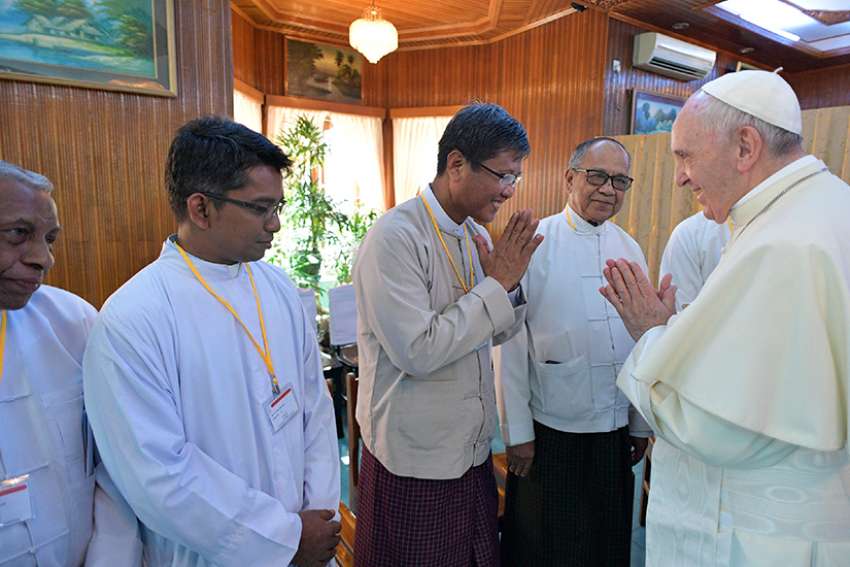Pope Francis greets men during a small informal meeting with a variety of religious leaders Nov. 28 at the archbishop's residence in Yangon, Myanmar.
CNS photo/L'Osservatore Romano
Unity, not uniformity, leads to peace, Pope says
By Cindy Wooden, Catholic News Service
YANGON, Myanmar – In a small, informal meeting with a variety of religious leaders, Pope Francis went to the heart of his message for Myanmar: unity, not uniformity, is the secret to peace.
Representatives of the Baptist, Anglican, Buddhist, Hindu, Jewish and Muslim communities, as well as leaders from ecumenical organizations, briefly told the Pope about their communities during the meeting Nov. 28 at the archbishop's residence in Yangon.
"The moment you spoke, a prayer came to mind. A prayer that we pray often, taken from the Book of Psalms: 'How good and how pleasant it is, when brothers dwell together as one,'" he said, quoting Psalm 133.
"United does not mean the same; unity is not uniformity, even within the same confession," he said. "Each one has its values, it riches and also its deficiencies."
Although the vast majority of people in Myanmar are Buddhist, the country's religious make up is varied. Myanmar also has some 135 recognized ethnic groups and in the struggle for recognition and political power, religion often has been used to further the cause or highlight differences.
"Let's not be afraid of differences," the Pope told the leaders.
While the group meeting the Pope included representatives of the country's Muslim community, there was no specific representation of the Rohingya Muslims, a group that has been subjected to severe restrictions and repression by the government. The Rohingya are not recognized as an ethnic group or as citizens. And the majority of the nation's people consider them a threat to peace and harmony.
One of the representatives, who was not identified, used the word "harmony" three times. Pope Francis said that in life, as in music, harmony comes from uniting differences, not eliminating them.
Today, the Pope said, there is "a global trend toward uniformity, to doing everything the same," but "that is killing humanity, that is cultural colonization."
People of faith believe in a creator, a father, which also should mean recognizing other human beings as brothers and sisters, he said. "Let's be like brothers and sisters. And if we argue among ourselves, let it be like brothers and sisters -- they are reconciled immediately. They are always brothers and sisters again. I think that is only way peace is built."
The Vatican said Pope Francis also met separately with Sitagu Sayadaw, a Buddhist leader who has publicly supported the military's crackdown on the Rohingya minority.
Greg Burke, director of the Vatican press office, said the meeting was part of the Pope's "effort to encourage peace and fraternal coexistence as the only way ahead."
Please support The Catholic Register
Unlike many media companies, The Catholic Register has never charged readers for access to the news and information on our website. We want to keep our award-winning journalism as widely available as possible. But we need your help.
For more than 125 years, The Register has been a trusted source of faith-based journalism. By making even a small donation you help ensure our future as an important voice in the Catholic Church. If you support the mission of Catholic journalism, please donate today. Thank you.
DONATE

